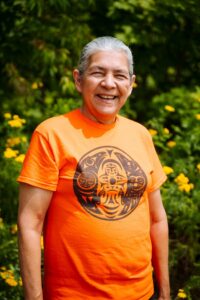Anishinaabe Elder shares advice for living with diabetes

By Jesse Johnson and Julie Harris
Evelyn Stone, an Elder from Michipicoten First Nation and member of the Anishinabek Nation Kwe-Wuk Advisory Council, was diagnosed with diabetes about 37 years ago. Her first exposure to diabetes was through her father whom she saw go through the troubles and complications that come with diabetes. Those difficult times made her realize she needs to take care of her own health.
Elder Stone has done work as a health program promoter and has been involved in holistic healing as well.
She fondly remembers having community cookouts down at the beach. She spoke about foods like dumplings, scones, Indian tacos, and bannock as treats, not everyday staples. While cooking for her father, she learned a lot about the meals and how important it was to boil the food rather than fry it.
“If you really need to eat something specific, take a day and eat what you want; but be aware to drink lots of water and exercise. Make sure you know how to take care of your sugar levels,” she advises.
She also spoke about the positive impacts bear grease can have on those with arthritis. Also, when she’s anxious and her blood-sugar levels are up-and-down, she uses Labrador tea for four days to calm her nerves and help her respiratory system.
Going back to her father’s diabetes, Elder Stone said it was sad when he would get an infection. Her father was the first in the area to have dialysis at home. Her father was airlifted to Toronto every month for treatment; but after a while, there was one time when she felt it was the last time she would see him. Her mother tried to make it to Toronto to see him, but sadly, he went into a coma just before her arrival.
One thing she learned from her father’s experience is that people have to go out of the community, sometimes three times each week, just to get dialysis.
“That takes a lot out of a person. When the elders have to go to a big city for dialysis, it’s difficult to get a chaperone to help. Sometimes the elder doesn’t have a vehicle, so they have to take a bus. Health Canada doesn’t know the area well enough to realize how far the elder has to travel in order to get suitable health care. People in the cities are making decisions for those who live in the communities.”
Elder Stone has been very active in sports like baseball. She also loves playing with her grandchildren at the lake.
“My biggest piece of advice is to go for a walk after eating a meal.”
If you would like more information on diabetes, please email the Anishinabek Nation Health Secretariat’s Diabetes Navigator at julie.harris@anishinabek.ca.


